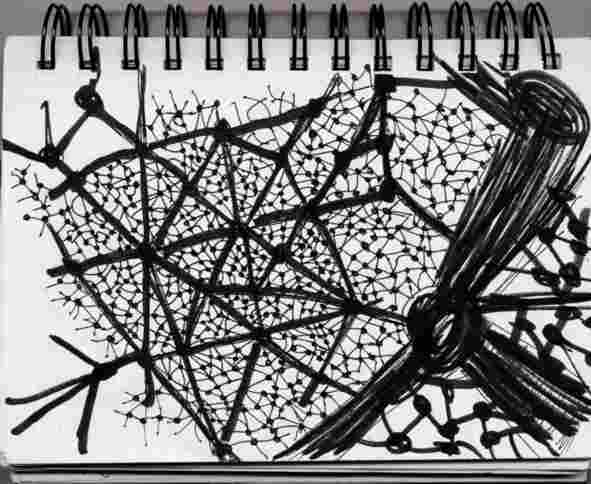
First, I'd like to thank Joseph Logan from publicorgtheory.com for his nice tribute concerning this coined term. I would defer to Gilles Deleuze and Felix Guattari as inspiration, as they use the rhizome as a theoretical construct quite effectively in "A Thousand Plateaus," but I am suitably honored nonetheless. Here's his definition, which I'll leave it to you all to tinker with:
Main Entry: blog·zome
Pronunciation: 'bläg-"zOm
Function: noun
Etymology: Combination of New Latin rhizomat-, rhizoma, from Greek rhizOmat-, rhizOma: mass of roots, from rhizoun to cause to take root; and New Internet blog, from Web log, an on-line diary compiled by one or more persons having something to say. Inspired by the erudite SpinDentist from AllSpinZone.
: an emergent form of organization comprising relatively like-minded Web logs ("blogs") often enriched by diversity and independence of thought. Loose organization and evolving form promotes shifting leadership and organizational flexibility.
- blog·zo·mic /bläg-'zO-mik, -'zä-/ adjective
I want to extend this conversation in another direction in an attempt to plot out some use-value even for this concept of the blogzome that is marked by multiplicity, unpredicability, freedom and independence. But first we must undertake to describe a problem for which the blogzome is a potential cure.
Let's imagine another structure from contemporary philosophy, the "Differend" from the work of the same name by Jean-Francois Lyotard. A "differend" situation is one where two entities cannot interact, much less converse. The speak different languages so much and their foundational principles are so opposed as to prevent discussion. Holocaust deniers versus those who believe in history are the example Lyotard uses, and those of us who believe in history simply shake our heads, unable to communicate with those who deny truth and history. We see them as willfully denying because of hate or perhaps some inner psychological need.
Are we in a differend situation in our current political discourse? I would argue that several issue that distinguish progressive and right-wing politics in the US at least vie for this dubious honor. The gay issue, the issue concerning choice, even the issues concerning the wing ding definitions of "liberal" and "conservative" seem, at least on first glance, to resemble a differend situation. How often have you talked to conservatives and asked them about their own core values, of small and less intrusive government, pointed out the Republican practices that belie these founding principles, and gotten denial in return. Yes, our current political discourse certainly seems to be wholly infected by a differend situation where we, the good guys, cannot understand the foundational values of the right-wing, much less understand them enough for compromise on these issues.
The differend is a fortress built from a foundation of a rationality the rest of us reject. Indeed, we do not call it rationality over here on the progressive side of the argument. It is as if on some molecular level that foundation cannot be penetrated. In the case of gay issues, that foundation appears to be two-fold, a combination of an inner sense of fear of sexuality often described in terms of disgust, and backed by a reading of scripture that is unassailable by its nature. "God said," after all, is a hard construct with which to argue without imputing a more powerful God. It matters not which came first, the disgust concerning homosexuality or the scripture; the combination of the two makes it impossible for the two sides to converse. And there you have the construct of the classic wedge issue, the Republicans appeal to and nurture those feelings not based on rationality in order to drive their constituents. Yes, I believe it is cynical ont he part of the leadership, that they use wedge "differend" issues without themselves believing, but that does not lessen the fact that the wedge works with much of their core supporters.
I will posit now that these differend issues are the most important walls to tear down in US political discourse, or, failing that, we should expose Republicans for their cynical use of wedge differend issues. How to do that against issues with such strong and alien foundations? Rhizomes/blogzomes are strong.
Blogzomes work like rhizomes not just in that they are unpredictable, not just in that there is no identifiable center, and not just their edges are ragged and one is never sure where they will expand next. Think of rhizome roots. They rise even against the cracks in sidewalks, even interrupt and expose basement floors. They strangle other plants, a patch of wild strawberries has been known to choke off other plant life nearby.
How to tear down the wedge/differend issues? The Blogzome needs to send shoots out underground and through the air to tear apart the cynical use of wedge/differend issues, for while Blogzomes have powerful roots, they still cannot penetrate foundations made of material made of faith or emotion. Left Blogistan is nothing if not wholly steeped in rationality, after all. We are members of the "reality-based community." Those roots and shoots should reach out and show those who base their views on emotion and faith that the Republicans who encourage them to do so, who aid and abet their rejection of rationality, are using them to such a degree that their stances on such issues as gay rights and choice are often worked up to such a degree as to constitute a fetishization of the texts of faith, of the bible. These folks have been encouraged by the Republicans to worship golden calves masquerading as "faith" at the expense of loving others.
I'm going to close here because this post is exceedingly long. But I'll let it stand as the latest entry in trying to "theorize" Left Blogistan. Hopefully it works towards a "praxis" as well.